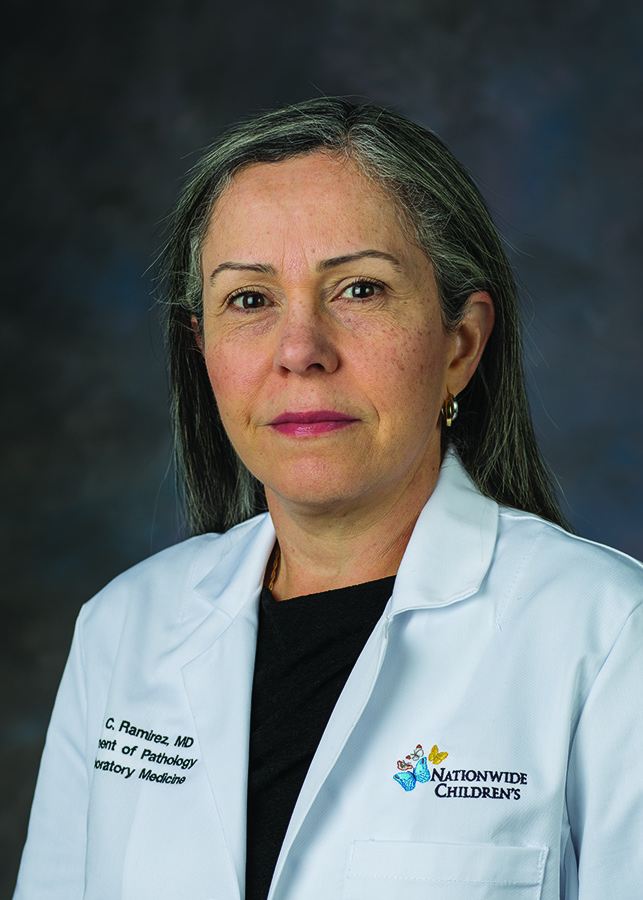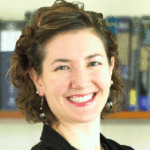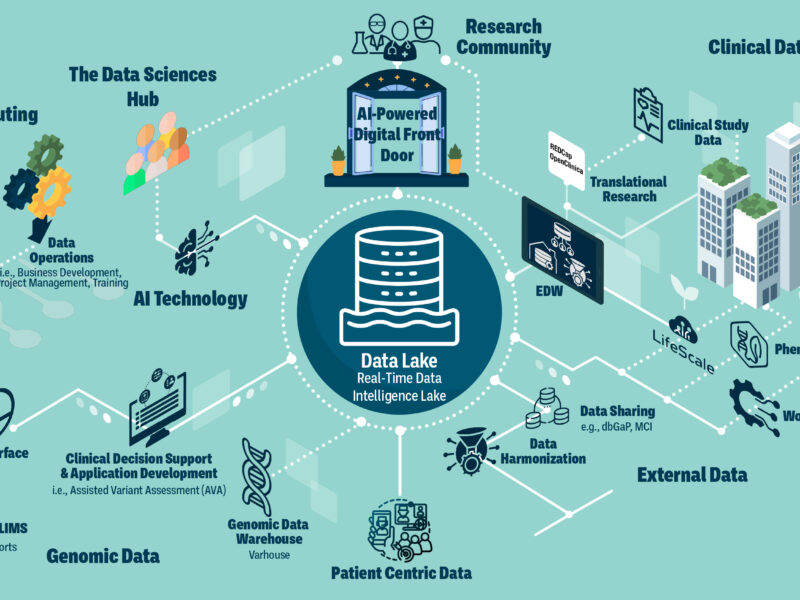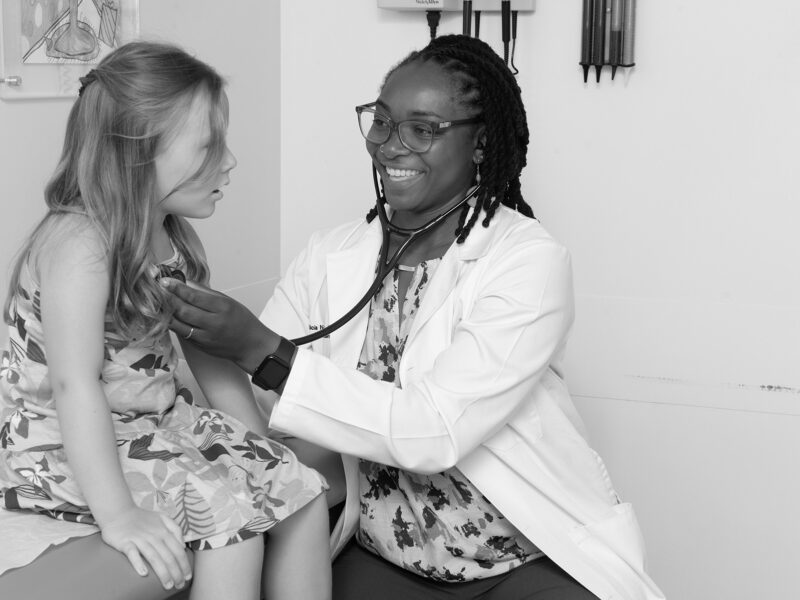Featured Researcher — Nilsa Ramirez, MD
Featured Researcher — Nilsa Ramirez, MD https://pediatricsnationwide.org/wp-content/themes/corpus/images/empty/thumbnail.jpg 150 150 Katie Brind'Amour, PhD, MS, CHES Katie Brind'Amour, PhD, MS, CHES https://pediatricsnationwide.org/wp-content/uploads/2021/03/Katie-B-portrait.gif- August 04, 2023
- Katie Brind'Amour, PhD, MS, CHES
Nilsa Del Carmen Ramirez Milan, MD, director of the Biopathology Center at Nationwide Children’s Hospital, leads the biorepository team that receives about 1,000 new specimens each day. These must be processed and stored properly—together with the rest of the biobank’s > 6 million specimens. Then there is the outflow of samples provided for clinical analysis or research efforts, which involves appropriate processing and distribution protocols as well.
Having been a key driver of the Biopathology Center’s growth for 16 years, Dr. Ramirez has become a valuable contributor to the development of national and international guidance on biobanking structure and protocols. She serves as the national commissioner of the College of American Pathologists’ Biorepository Accreditation Program and helped develop the International Organization for Standardization’s general requirements for biobanking (ISO 20387) and biobanking best practices for the International Society for Biological and Environmental Repositories.

A large part of her work as director of the Biopathology Center involves supporting research for cancer clinical trials and study centers such as the Children’s Oncology Group (COG)—distributing samples to approved investigators, helping with molecular characterization for genomics profiles, improving turnaround time for sample requests, and analyzing tumor slides to glean key clinically relevant data. Recent successes include publication of COG’s pediatric MATCH Trial data, which has demonstrated feasibility of a national screening protocol to identify actionable genetic alterations in pediatric and young adult patients with refractory cancers.
As she looks forward, she is eager to continue advancing the world of pediatric oncology research through her own pathology work, management of the Nationwide Children’s Biopathology Center and the standards she’s helping create for biorepositories around the world.
Read on to learn more about Dr. Ramirez’s work and research career.
How did you land in your field?
The field of pathology encompasses many of the things that attracted me to medicine, including being a health care professional that works in a laboratory setting and participates in patient care efforts using a team approach. This challenging environment not only encourages me to analyze, investigate, and diagnose medical conditions in my area of expertise, but also allows me to communicate with, and learn from, other clinicians.
Why did you decide to pursue your work at Nationwide Children’s?
The Abigail Wexner Research Institute allowed our team to pursue mainly National Cancer Institute (NCI)-sponsored grant support to develop the infrastructure to create and maintain complex biobanking activities in the context of cancer clinical trials. Those activities not only relate to research, but also to clinical laboratory testing for patients enrolled in these trials. The clinical and research synergy was important to me, and I enjoyed being able to keep a strong emphasis on NCI-sponsored work. I value the opportunities NCH offers, allowing me to support biobanking-related research efforts in the context of cancer clinical trials and also practice perinatal and autopsy pathology.
What’s next? What do you hope to accomplish in your research and professional development going forward?
Over the past 10 years, biobanking has become more structured. Some of this has to do with the implementation of accreditation programs and the development of robust standards, like best practices for biobanks, at the national and international level. The role of biobanks is expanding to become a key part of both the practice of medicine and medical research.
Fun Facts About Dr. Ramirez
What’s your favorite word, and why?
Sustainability. It brings a sense of hope, of being able to positively influence our social, economic, and natural resources without spoiling them for future generations.
What do you usually eat for breakfast?
Ginger tea and wheat toast.
What would be your dream job if you could do anything (that wasn’t working in research)?
I would be a mail carrier who delivers and collects mail on foot during just the spring and fall.
What’s your favorite food?
Yogurt with maple syrup.
Favorite way to relax?
Reading a cozy mystery book or an interesting biography.
Biobanking has become a crucial component of the infrastructure that supports research contributing to precision medicine efforts. The biobank ensures the samples are properly stored and retrieved when medicine can benefit from advances in research technology, even if it’s years down the line when we have more information. We will continue to learn much more about hereditary conditions, rare genetic diseases, and intractable cancers because of the samples these banks store. As biobanking grows and continues to build on collection/distribution ethics and storage standards, I look forward to seeing how much more it will contribute to patient care and society, beyond just the scientific value of it.
About the author
Katherine (Katie) Brind’Amour is a freelance medical and health science writer based in Pennsylvania. She has written about nearly every therapeutic area for patients, doctors and the general public. Dr. Brind’Amour specializes in health literacy and patient education. She completed her BS and MS degrees in Biology at Arizona State University and her PhD in Health Services Management and Policy at The Ohio State University. She is a Certified Health Education Specialist and is interested in health promotion via health programs and the communication of medical information.
-
Katie Brind'Amour, PhD, MS, CHEShttps://pediatricsnationwide.org/author/katie-brindamour-phd-ms-ches/April 27, 2014
-
Katie Brind'Amour, PhD, MS, CHEShttps://pediatricsnationwide.org/author/katie-brindamour-phd-ms-ches/April 27, 2014
-
Katie Brind'Amour, PhD, MS, CHEShttps://pediatricsnationwide.org/author/katie-brindamour-phd-ms-ches/April 27, 2014
-
Katie Brind'Amour, PhD, MS, CHEShttps://pediatricsnationwide.org/author/katie-brindamour-phd-ms-ches/April 28, 2014
- Posted In:
- Featured Researchers







